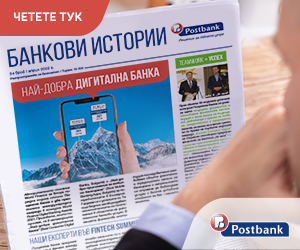Petia Dimitrova, Postbank’s Chief Executive Officer and Chairperson of the Management Board: OUR GOAL IS TO PROVIDE DIGITAL SERVICES THAT ARE AS FLEXIBLE AS POSSIBLE
3th of January 2020
Ms. Dimitrova, the operational merger of Postbank and Piraeus Bank Bulgaria is already a fact. What effects do you expect from this deal?
We managed to complete the acquisition of Piraeus Bank Bulgaria in record time – the merger of the systems and branch network was completed on November 18, the legal merger happened five days prior, while the preparations took less than five months. This is a record for our market, because it is our second merger in the past three years and we have already gained valuable experience. I am very proud of this fact and even prouder of my team, which managed to make the impossible possible, all without making our main business suffer. The deal is of key importance for the Eurobank Group, which we’re a part of, and whose main shareholders are Canadian and American funds. Its strategy is to expand its activities with a focus on markets where it is a leader. For me, this is also a new landmark point in Postbank’s successful history, which has been among the leaders on the Bulgarian market for 28 years already. We are merging with Piraeus Bank Bulgaria our strengths, which include international expertise and gained experience, but above all, we are merging our teams of professionals, who are our most valuable asset. After the merger, Postbank is becoming even bigger and will offer more to its clients. Our share on the Bulgarian market exceeds 10% in terms of asset value, credits and deposits. We are reaffirming our position of a systemic bank on the market, as we will rank with a credit portfolio worth BGN 7.5 billion and deposits worth BGN 9.3 leva billion. We are expanding our branch network, which is an additional benefit for our customers.
Our plans for after the merger are ambitious -first, to achieve even more value added for customers, society, our employees and shareholders. In 2020 we’ll stay focused on our priority – to offer our clients the best customer experience, the so called “customer journey”, based on their individual needs, as well as innovative digital services.
The deal with Piraeus Bank Bulgaria is yet another move towards consolidation, which is ongoing in the banking sector both at national and global level. Do you expect this tendency to continue? Is there a risk for international banking corporations to become too large and cumbersome in a time when increasingly quicker and flexible competitors are emerging from the high-tech sector?
Consolidation is a natural process that moves the market forward. The fact that we’re becoming bigger does not mean we are becoming less flexible or innovative. Quite the opposite -this allows us to direct more resources to new products and services, to various digital customer contact channels, which lead to a better service. This is practically a way for them to compete even more successfully with all other players on the market, including FinTech companies, for providing solutions that lead to higher customer satisfaction. In Postbank we have developed and are implementing a strategy for digitalization, which is precisely related to the application of innovations in everyday banking that are of use to customers. An example of such an exceptionally successful project of ours is the introduction of a more modern and secure way to confirm payment documents with an electronic signature. It was recently awarded in one of the most prestigious European banking competitions – The Retail Banking: Europe 2019 Awards, in the Excellence in Customer Centricity or Customer experience category. As a modern bank that is concerned about the environment and our customers’ care, we are among the first on the Bulgarian market to offer the signing of documents with an e-signature across our branch network of close to 200 offices. With the introduction of the project, we managed to reduce our paper costs by 43%, logistics by 30% and customer service time by 12%. I would like to underscore that we won this award while competing with some of the biggest banks in Europe, such as Santander, Danske Bank, Nordea, BBVA, Raiffeisen Bank, OTP Group, among others, which is a source of pride not only for us, but for the whole Bulgarian banking sector. For our innovations and customer care in the past two years, we were awarded the best retail banking in Bulgaria award by the London-based World Finance Review Magazine. The dozens of other awards come to prove that we are on the right path in constantly improving customer care and satisfaction and consulting the when they need it, which means we’re available 24/7. We launched a special mobile application for our merger with Piraeus Bank Bulgaria – EVA Postbank, which answers all customer questions about the changes they can expect. After the merger, we will expand this channel’s capabilities in order to provide even more diverse and useful information, ranging from new products and services, finding the nearest offices and ATMs, advice on how to apply for loans online, to providing help in case a card is lost or a PIN code is forgotten. What’s unique about this application is that has a “live chat” with an expert from the bank, who can offer help in case the customer has a more specific question. This is an exceptionally successful innovation of our bank, which was highly praised by customers. The first banking credit chatbot in Bulgaria – EVA (Electronic Virtual Assistant), offers useful information via Facebook Messenger and now on the Application. EVA also received high European recognitions – our innovation is in the top 9 list of the prestigious international competition EFMA, competing with over 600 innovations, and we are national winner in this year’s European business awards’ innovations category.
Therefore, if I could summarize things, the speed of digitalization and introducing innovations depends on the bank itself, its strategy and desire to respond to customer needs.
We recently came across a study, according to which over two-thirds of young Americans would rather go to the dentist than a bank office. For years, you have pointed to digitalization as the foundation of your strategy for development. Meanwhile, Bulgaria, although a main center for developing financial technologies, remains at the bottom of the EU with its share of online banking. Can we expect a sudden breakthrough in this regard, like a sharp rise in mobile banking, for example?
The statistics you’re quoting sound interesting, but I doubt they are valid for Europe and surely not for Bulgaria. According to a nationally representative poll, which we conducted together with Gemius, attitudes in Bulgaria vary significantly – over 80% of people still prefer to visit the bank’s office in order to be personally consulted about the different products. The is precisely why, we at Postbank continue to invest heavily in the development of our branch network and our offices’ transformation, in order to better suit them for the customers who prefer personal service. In November, as part of the campaign for acquiring Piraeus Bank Bulgaria, we officially opened at a special event with a livestream our first three innovative branches, which will offer even better service to our customers. These “digital” offices are located in two of the busiest shopping malls in Sofia – The Mall and Paradise Center, as well as on Beli Dunav (White Danube) Street in Sofia’s Nadezhda district. What’s unique about them is that they have a completely new super-modern design, which offers comfort and coziness to customers, in combination with the digital selfservice zones, which saves time and respond to our customers’ expectations. These zones offer amenities such as deposit ATMs. The self-service zone will gradually expand the services it offers by including transactions between accounts, applying for loans and other banking services. The focus in the new types of branches will be much more on consultations and offering flexible solutions catered to the clients’ specific needs, while routine operations can be made in the self-service zone, which is very convenient. As far as digital banking goes, I believe that it is the future of banking services. Clients are discovering its advantages more and more and we are seeing three-figure growth of its use in our bank annually. This trend will surely continue because digital banking is convenient, userfriendly, offers remote operations, and last but not least, its terms are more advantageous for customers.
That’s why we will continue to further develop digital channels with new functionalities, while working on other interesting innovative projects, which we are yet to present to our customers in 2020. Our goal is to be as flexible as possible and offer personalized banking products and services to our customers, as well as various communication channels – we have excellent offers for those who prefer the brick and mortar offices, as well as those who would like to do their banking on their phones.
You described 2018 as the best year for Postbank so far. How does 2019 look so far? How are Bulgarian banks generally doing in this environment of unusually low interest rates?
The recent years in Bulgaria were marked by sustainable economic and income growth, and low unemployment, which reflect directly on the whole banking sector’s results. The favorable economic environment predisposes people and companies to be more active and take on projects that had been put on hold or even their bolder plans. We can definitely describe 2018 as a very successful year for Postbank and our expectations for 2019 are no different. What’s more is that we are finalizing the strategically important acquisition of Piraeus Bank Bulgaria, which makes us an even bigger and stronger systemic bank, one of the market leaders. The interest rates from recent years can definitely be described as unusually low, which is a challenge for the whole sector not only in Bulgaria, but in many other countries as well. Specifically un Bulgaria, we have reached record-low interest rates that have not been seen our recent history. The margins are contracting, which has a negative impact on bank’s return rates. Fortunately, we are in an upward economic cycle, demand for credits remains stable and we manage to compensate the lower interest rates with the higher volumes – according to data for the third quarter, there was a credit increase of around 7% year-on-year. The high liquidity is also helpful in that regard, as it allows us to maintain stable liquidity buffers.
It seems that the policy of low interest rates and the use of quantitative easing by the European Central Bank (ECB) will remain for a while. When it was introduced, it was a very good measure for dealing with the crisis, but its efficiency is starting to wane and it is time for the arsenal to be supplemented with new measures.
The typical consequence of low and even negative interest rates is that investments are redirected towards other assets, like real estate properties, which significantly pumps their prices up. Do you see any similar effects in Bulgaria?
Yes, there is renewed investment interest in real estate in recent years, but this is largely due to Bulgaria’s positive economic development and the higher incomes. We cannot talk about a bubble yet, because the price increase is moderate and under 10%, while the average wage has been increasing by two-digit figures in the past years. It’s true that there is quite a lot of available money on the market, but it’s not being directed only towards real estate. The money is also going towards other alternative forms of investments with a good return rate. In Postbank, for example, we are successfully offering mutual funds, which are affordable alternatives for long-term saving and can respond to the individual investor profile. These products ensure access to shares, bonds and other securities in Europe, the US, Japan and global emerging markets, and the fact that they are completely harmonized with European legislation is a benefit. What’s unique about them is that customers can participate with smaller sums as well – the equivalent of 50 leva in euro or US dollars. We are offering even more interesting investment opportunities to the higher segment of customers, including 100% Wealth Management, thanks to our successful partnership with Eurobank Private Bank Luxembourg.
According to the Finance Minister, by the end of next April Bulgaria can expect an invitation to join the ERMII mechanism – the “eurozone waiting” room. How likely is Bulgaria’s eurozone membership in the near future and what effects would it have on the banking system?
Bulgaria’s joining the eurozone has no alternative – we have accepted this with our EU Membership already. The economic crisis, however, delayed our accession, and although we have been meeting all criteria for a while, some Member States needed more time to become convinced to take the next step. Bulgaria’s eurozone membership will not have too much of an effect on our banking system, because a large part of the benefits are already present – we have had a fixed exchange rate of the lev for more than 20 years, interest rates are comparable to those in many countries in Central and Western Europe, we equalized the leva and euro transaction fees. We are soon expected to become a part of the banking union, but this, too, will not lead to any significant changes – for a long time we have been observing the same laws and regulations, which apply not only for the eurozone, but all banks across the EU. We must not forget that most Bulgarian banks are part of big European and international groups, and thanks to this, they have long been under the ECB’s supervision.
Czechia, Poland and Hungary are demonstrating an increasing unwillingness to adopt the euro. Why is Bulgaria’s position different? Should we be looking for an explanation in the currency board alone?
Yes, the currency board is the main reason, combined with the fact that a whole generation grew up with it and is taking it for granted. We Bulgarians are bigger supporters of the enhanced European integration and we account for the fact that it is generally beneficial to the people and businesses in this country.
***
PETIA DIMITROVA is Chief Executive Officer and Chairperson of the Management Board of Postbank. She is Member of the Management Boards of the Association of Banks in Bulgaria, the Atanas Bourov Foundation, Borica AD, the Endeavor Bulgaria Association, the International Banking Institute, she also is an associate member of the Management Board of the Confederation of Employers and Industrialists in Bulgaria, a member of the University Council of the American University in Bulgaria, as well as Member of the Industrial Advisory Board – CITY 1 College, International Faculty of the University of Sheffield. She also is a Member of the Young Presidents’ Organization (YPO), Member of the Young Global Leaders Forum, part of the World Economic Forum, Member of the Gerson Lehrman Group Accounting Council London, UK, Fellow Member of the Chartered Management Institute, UK and Cofounder of the Public Council of Women in Business. She has received many awards, including the Mrs. Economy award, Banker of the Year and the Atanas Bourov Foundation’s award for Banking and Financial Management.











